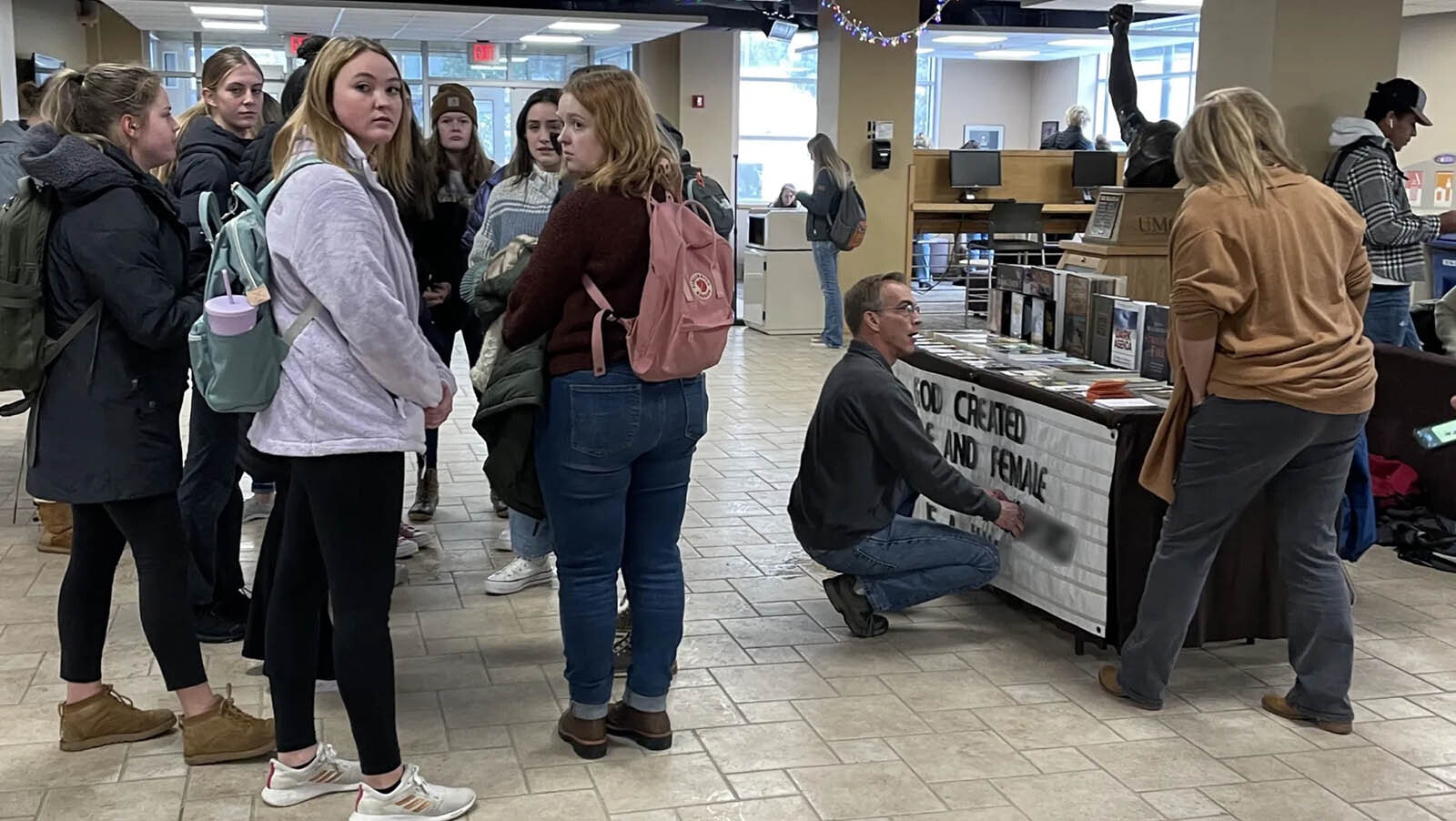A federal judge Thursday dismissed parts of a Laramie, Wyoming, church elder’s free-speech discrimination lawsuit against the University of Wyoming, but let the bulk of his complaint remain in court.
Nancy Freudenthal, U.S. District senior judge for Wyoming, ruled in a Thursday order that Todd Schmidt may not sue University of Wyoming Dean of Students Ryan O’Neil in her individual capacity, but most of his claims against O’Neil and UW President Ed Seidel in their official capacities can go forward.
In Schmidt’s original complaint filed June 15, he’d requested nominal damages, or a small amount of money, from O’Neil.
Freudenthal also dismissed Schmidt’s claim that the officials applied vague policies to him to violate his right to due process.
What Started It
The controversy giving rise to this case started Dec. 7, 2022, when Schmidt displayed a sign from his table at the UW Student Union in protest of a UW-based sorority, Kappa Kappa Gamma, having admitted its first transgender sorority member, Artemis Langford.
“God created male and female and Artemis Langford is a male,” Schmidt’s sign said.
O’Neil asked Schmidt to cover Langford’s name on the sign, and the university later banned Schmidt from presenting in the Student Union for one year, saying he targeted Langford.
In an Aug. 18 preliminary injunction temporarily blocking the university’s actions, Freudenthal reversed the ban and ordered the university not to censor Schmidt’s viewpoint.
The judge wrote that she issued the injunction because Schmidt is likely to win the parts of his lawsuit alleging First Amendment violations, and because people suffer by default when governments restrict protected speech.
Most Of These Remain
Freudenthal is allowing Schimdt’s four other claims to advance. Those include claims that the UW officials censored his speech, improperly banned him from his reserved table at the UW Student Union, treated him unequally from other presenters and violated his right to be free from unconstitutional conditions.
Schmidt’s claim that the university discriminated against him, as a Christian, while letting other presenters share their viewpoints in the Student Union, can remain in the lawsuit going forward, but Freudenthal said she is merging it with Schmidt’s claim that the officials censored him specifically because of his viewpoint.
Viewpoint discrimination is a wrong that courts have recognized as detrimental to the free-speech right.
Because She Didn’t Know
Government officials don’t enjoy immunity from lawsuits if, during the controversy, they could reasonably have known they were violating someone’s rights.
It is clearly established that governments can’t censor someone based on their viewpoint, wrote Freudenthal.
O’Neil suspected that when she asked Schmidt to cover Langford’s name, Schmidt was harassing Langford. Harassment is not protected speech.
Ultimately, Freudenthal wrote in her preliminary injunction order that Schmidt’s conduct didn’t rise to the high legal bar of harassment. But O’Neil wouldn’t have known that, necessarily, on Dec. 7.
“Dean O’Neil believed Schmidt’s use of a particular student’s name constituted harassment of that student based upon that student’s membership in a class protected by law,” wrote the judge. “While this Court disagreed, the analysis was not straightforward, and Dean O’Neil’s belief was not unreasonable.”
First Amendment legal analyses are complicated, Freudenthal added, and courts often show a high degree of deference toward educators’ professional judgment, “because of the important, difficult job they perform.”
Policies Aren’t Perfect
In dismissing Schmidt’s claim that the policies UW applied to him are so vague they’re unconstitutional, Freudenthal said that Schmidt failed to back up the claim.
School policies have more leeway for potential vagueness than criminal laws, according to earlier case law. Also, wrote the judge, courts often recognize that schools have a duty to maintain discipline, and they give their less-specific policies some grace.
Schmidt claimed that a Student Union policy letting officials deny reservation space for “historic negligence or abuse” was so vague he didn’t know how he’d violated it, and it didn’t address the situation with his sign.
Schmidt and the UW officials have been sparring in court over whether, and to what extent, Schmidt broke the Union rules prior to Dec. 7 and “got in people’s faces.”
The officials say Schmidt had been a problem for a while.
Schmidt says he didn’t know about any student complaints, and has had no warning from UW about student complaints.
Either way, Freudenthal ruled, the policy doesn’t flunk the vagueness test just because it was faulty here. It still fits the school context and has a “clear purpose,” she added.
Schmidt also argued that a UW tabling policy ordering presenters to “bring their views in a respectful and civil manner” is vague.
He believed he was behaving civilly, Freudenthal’s order recounts.
“His belief does not mean the policy fails to provide a standard for conduct,” Freudenthal wrote. It’s an “imprecise but comprehensible normative standard.”
Lastly, the judge decided that Schmidt failed to show that the two policies encourage arbitrary and discriminatory enforcement, and she dismissed his vagueness claims against them.
Clair McFarland can be reached at clair@cowboystatedaily.com.





